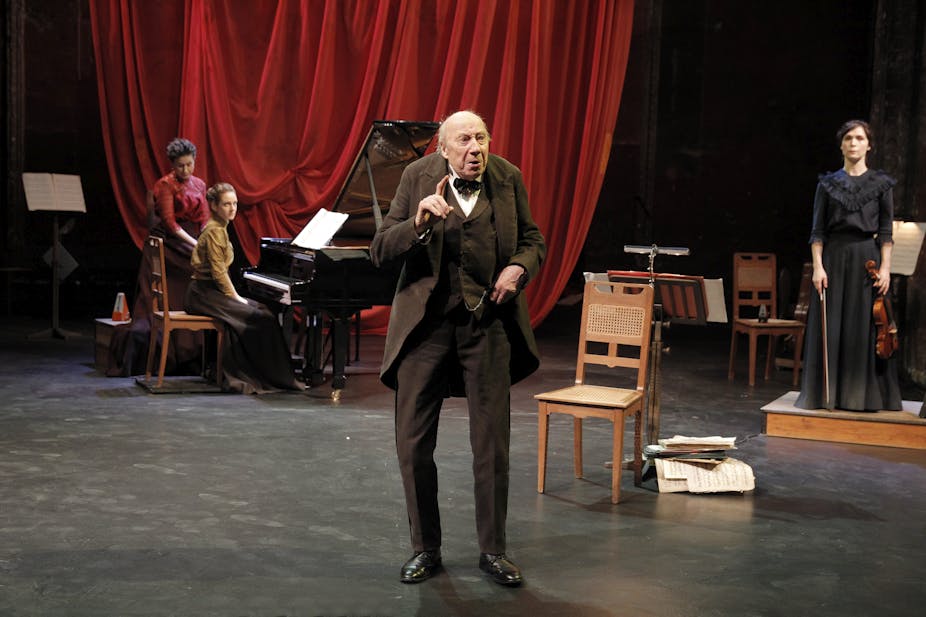At least four metronomes ticked away at various points on the stage as the audience seated itself for last night’s opening performance of Anton Chekhov’s On The Harmful Effects of Tobacco at the Sydney Festival. One expects to find metronomes in a music school, where this one-act play was set, but the dissonance was disconcerting.
The noise signified what would come: Chekhov’s tortured Nioukhine, played by Michel Robin, relieving his soul in words set to music that is only sometimes peaceful. The heart of the play reveals itself in the wail of a violin, finally answering and replacing that original disharmony of meticulous metronomes.
And he certainly needs relief! Trapped in a miserable marriage, he is dog’s body and lecturer in a school run by his wife. She keeps all the profits and he does all the work, apparently. Should we take this with a grain of salt? The presence of three other figures on stage eventually, soul-wrenchingly, supports his claims at least about the general tenor of her tyranny.
Nioukhine first comes on to the stage to stop some of the metronomes. Relief! And then he proceeds to bumble on and off the main scene. At one moment he comes in with some groceries in a netted bag. He sets them down and leaves.
And then, as pianist and violinist treat us to a sonata by Bach, a page turner encouragingly next to the piano, he walks on and off, apparently on a variety of errands. The musicians exchange glances and roll their eyes, and proceed. They pass quickly from one movement to another, apparently hoping not to be disturbed.
But disturbance is nigh. Nioukhine’s wife has ordered him to give a lecture, for charity, on the harmful effects of tobacco – perhaps to remind him that smoking is yet another pleasure he should forego.
The idea of speaking for charity may be a double entendre. With strangers before him and an absent wife, the protagonist has all he needs. Hesitatingly and humorously he begins; and then his tone turns almost to pleading.
Like a beggar, he needs something from us. We need to perform the act of charity of listening. His final words emphasise the point: Dixi et animam levavi – I have spoken and relieved my soul. Speaking to himself alone could not bring such soothing spiritual lightness.
As he continues, the lecture therefore became less of a chore for him, and more an excuse to speak about what was really on his mind. And so we heard not only of everything that he is forced to do, but also of the way he is abused.
“Scarecrow”, she calls him – and the name does seem quite fitting given the figure cut by the man before us. The audience chuckle, until we hear that she also names him “devil” and “viper”. And he really does seem to be genuinely afraid of her – terrified, even. All he wants, in this swirl of mundane work and daily abuse, is peace – or repose, to take the English for the French word used.
When he was young – an idea difficult to imagine for us now as we look at him – he went to university. And he, like others, had dreams.
Such dreams are echoed in the music played, especially when he beckons the page-turner to come ever gradually toward centre-stage, to sing an aria. Her shyness and his encouragement establish that there is already a relationship between him and these women.
One way to read his predicament is to say that he is a man trapped in a world of women. But the situation proves more complicated. At least two of these women are his daughters (his wife has seven daughters, we are told). And they are just as imprisoned as he is: no man can ever get near them, and so they will probably never get married. Once a year, when they visit their aunt, is their only hope of meeting any suitors. It is also his only chance for a drink.
And so, these women are drawn into greater awareness of his world of woe, because they are already there. The effect is devastating. No longer do they offer semi-polite boredom and groans of embarrassment. Instead, there are glances of recognition and distress, segueing into the gripping and disturbing performance of Luciano Berio’s Sequenza VIII for violin.
The violinist is Floriane Bonanni; the moment was stunning, and the piece relentless. One did not know where it would end. And as she played, she wept and lamented, emphasising that she shared her father’s anguish in a visceral way.
In the show notes, Bonanni, whose idea it was to punctuate Chekhov’s words with this music, tells us that Berio wrote the piece in response to another that we hear by Bach – his Partita No. 2 in C Minor, for solo violin. It is grating, especially because lacking a distinctive narrative arc. Like Nioukhine’s misery, it is restless and ceaseless.
This French production is a marriage between words and music. The music cuts to the core of Nioukhine’s message. Anything that soothes him cannot be entirely harmful.
On the Harmful Effects of Tobacco plays at the Sydney Festival until January 25. Details here.

